Percompa 4 mg Tablet 10's
MRP ₹165.5
(Inclusive of all Taxes)
₹24.8 Cashback (15%)
Provide Delivery Location
Online payment accepted
 Prescription drug
Prescription drugWhats That
Composition :
Manufacturer/Marketer :
Consume Type :
Expires on or after :
Return Policy :
About Percompa 4 mg Tablet
Percompa 4 mg Tablet belongs to a group of medicines called anticonvulsants or anti-epileptics used to treat epilepsy. Epilepsy is a sudden rush of electricity in the brain. In epilepsy, the brain's electrical rhythms become imbalanced, resulting in recurrent seizures, sometimes leading unconscious state.
Percompa 4 mg Tablet contains 'Perampanel'. It prevents seizures or epilepsy by blocking a receptor in the brain known as the glutamate receptor, thereby suppressing the brain's abnormal and excessive activity of the nerve cells.
In some cases, Percompa 4 mg Tablet may cause common side effects such as dizziness, drowsiness, increased or decreased appetite, weight gain, fatigue, and nausea. Most of these side effects do not require medical attention and will resolve gradually over time. However, you are advised to talk to your doctor if you experience these side effects persistently.
Percompa 4 mg Tablet is not recommended during pregnancy and in children below four years. Consult your doctor if you are breastfeeding. Percompa 4 mg Tablet may cause drowsiness and dizziness, so drive only if you are alert. Avoid consuming alcohol along with Percompa 4 mg Tablet as it could lead to increased dizziness and drowsiness. Consult your doctor immediately if you experience suicidal tendencies. Keep your doctor informed about your health condition and medicines to rule out any side effects.
Uses of Percompa 4 mg Tablet
Directions for Use
Key Benefits
Percompa 4 mg Tablet belongs to a group of medicines called anticonvulsants or anti-epileptics. Percompa 4 mg Tablet contains perampanel. It is used to treat epilepsy. Percompa 4 mg Tablet prevents seizures or epilepsy by blocking a receptor in the brain known as the glutamate receptor, thereby suppressing the abnormal and excessive activity of the nerve cells in the brain.
Storage
- Inform your doctor about dizziness symptoms. They may adjust your medication regimen or prescribe additional medications to manage symptoms.
- Follow your doctor's instructions for taking medication, and take it at the same time every day to minimize dizziness.
- When standing up, do so slowly and carefully to avoid sudden dizziness.
- Avoid making sudden movements, such as turning or bending quickly, which can exacerbate dizziness.
- Drink plenty of water throughout the day to stay hydrated and help alleviate dizziness symptoms.
- If you're feeling dizzy, sit or lie down and rest until the dizziness passes.
- Track when dizziness occurs and any factors that may trigger it, and share this information with your doctor to help manage symptoms.
- Avoid driving or operating machinery or activities that require high focus until you know how the medication affects you.
- Maintain a fixed sleeping schedule, create a relaxing bedtime routine and ensure your sleeping space is comfortable to maximize your sleep quality.
- Limit alcohol and caffeine as these may worsen drowsiness and disturb sleep patterns.
- Drink plenty of water as it helps with alertness and keeps you hydrated and for overall well-being.
- Moderate physical activity can improve energy levels, but avoid intense workouts right before bedtime.
- Rest well; get enough sleep.
- Eat a balanced diet and drink enough water.
- Manage stress with yoga and meditation.
- Limit alcohol and caffeine.
- Physical activities like walking or jogging might help boost energy and make you feel less tired.
- Manage stress by practising deep breathing, yoga or meditation.
- Get enough sleep. Maintain a regular sleep cycle.
- Exercise regularly. Try physical activities like walking, running, or dancing.
- Limit stimulants like tea, coffee and alcohol.
- Identify triggers and try managing them.
- Take a break by scheduling time for yourself.
- Try creative activities like writing, dancing or painting as it helps release tension.
- Inform your doctor about the nausea and discuss possible alternatives to the medication or adjustments to the dosage.
- Divide your daily food intake into smaller, more frequent meals to reduce nausea.
- Opt for bland, easily digestible foods like crackers, toast, plain rice, bananas, and applesauce.
- Avoid certain foods that can trigger nausea, such as fatty, greasy, spicy, and smelly foods.
- Drink plenty of fluids, such as water, clear broth, or electrolyte-rich beverages like coconut water or sports drinks.
- Use ginger (tea, ale, or candies) to help relieve nausea.
- Get adequate rest and also avoid strenuous activities that can worsen nausea.
- Talk to your doctor about taking anti-nausea medication if your nausea is severe.
- Record when your nausea occurs, what triggers it, and what provides relief to help you identify patterns and manage your symptoms more effectively.
- Uncoordinated muscle movements need immediate medical attention.
- Observe your movements and try to understand and control the particular movement.
- Regularly do strengthening exercises to improve blood flow throughout the body and avoid involuntary movements.
- Implement massage techniques to enhance blood flow to organs.
- Take a balanced diet and quit smoking.
- Practice yoga and meditation to improve thought processes and reduce uncontrolled and involuntary movements.
- Inform your doctor about dizziness symptoms. They may adjust your medication regimen or prescribe additional medications to manage symptoms.
- Follow your doctor's instructions for taking medication, and take it at the same time every day to minimize dizziness.
- When standing up, do so slowly and carefully to avoid sudden dizziness.
- Avoid making sudden movements, such as turning or bending quickly, which can exacerbate dizziness.
- Drink plenty of water throughout the day to stay hydrated and help alleviate dizziness symptoms.
- If you're feeling dizzy, sit or lie down and rest until the dizziness passes.
- Track when dizziness occurs and any factors that may trigger it, and share this information with your doctor to help manage symptoms.
Drug Warnings
Do not take Percompa 4 mg Tablet if you are allergic to any of its contents. Inform your doctor before taking Percompa 4 mg Tablet if you have serious liver problems, moderate or severe kidney problems, alcoholism, or drug dependence. Percompa 4 mg Tablet is not recommended during pregnancy and in children below 4 years. Consult your doctor if you are breastfeeding. Percompa 4 mg Tablet may cause drowsiness and dizziness, so drive only if you are alert. Avoid consuming alcohol along with Percompa 4 mg Tablet as it could lead to increased dizziness and drowsiness. Keep your doctor informed about your health condition and medicines to rule out any side effects.
Drug-Drug Interactions
Drug-Drug Interactions
Login/Sign Up
Using ketamine together with Percompa 4 mg Tablet may increase side effects such as dizziness, drowsiness, confusion and difficulty concentrating.
How to manage the interaction:
Although there is a possible interaction between Percompa 4 mg Tablet and Ketamine, you can take these medicines together if prescribed by your doctor. However, if you experience any unusual symptoms contact your doctor immediately. Do not stop using any medications without talking to your doctor.
When buprenorphine is used with Percompa 4 mg Tablet, it may lead to significant adverse effects.
How to manage the interaction:
Concomitant administration of buprenorphine alongside Percompa 4 mg Tablet can result in an interaction, it can be taken if a doctor has advised it. You should avoid driving or operating hazardous machinery until you're aware of how these medications effect you. Consult a doctor if you have any questions or concerns. Do not discontinue any medications without consulting a doctor.
Co-administration of Percompa 4 mg Tablet with esketamine can increase the risk of side effects of Percompa 4 mg Tablet.
How to manage the interaction:
There may be a possibility of interaction between Percompa 4 mg Tablet and Esketamine, but it can be taken if prescribed by a doctor. However, if you experience any unusual symptoms contact your doctor immediately. Do not stop using any medications without talking to your doctor.
Using sodium oxybate together with Percompa 4 mg Tablet may increase side effects such as dizziness, drowsiness, confusion, difficulty concentrating
How to manage the interaction:
Although taking Percompa 4 mg Tablet and Sodium oxybate together can evidently cause an interaction, it can be taken if your doctor has suggested it. Do not stop using any medications without talking to your doctor.
Drug-Food Interactions
Drug-Food Interactions
Login/Sign Up
Diet & Lifestyle Advise
- Meditation and yoga can help lower stress, decrease pain sensitivity and improves coping skills.
- Exercising regularly helps in maintaining weight and improving overall health.
- Rest well, and get plenty of sleep.
- Prepare your living area; small changes may help reduce the risk of physical injury during a seizure.
- Understand what triggers seizures and try reducing or avoiding them.
- Please pay attention to overall health, as it can help reduce seizure activity.
- Have a seizure response plan, and help those around you know what to do.
- Install an alarm or emergency device to get assistance during a seizure attack.
- A ketogenic diet (low in carbohydrates and high in fats) is recommended for children with epilepsy. This diet helps utilise fat instead of glucose for the generation of energy.
- Atkins diet (high fat and controlled carbohydrates) is recommended for adolescents and adults.
- Avoid smoking and alcohol consumption.
Side Effects of Percompa 4 mg Tablet
- Dizziness
- Drowsiness or sleepiness
- Increased or decreased appetite
- Weight gain
- Feeling aggressive, angry, irritable, anxious or confused
- Fatigue
- Nausea
Habit Forming
Therapeutic Class
All Substitutes & Brand Comparisons
RX
Out of StockFytonil 4 Tablet 15's
Alteus Biogenics Pvt Ltd
₹148.5
(₹9.9 per unit)
33% CHEAPERRX
Out of StockHetram 4Mg Tab 10'S
Hetero Healthcare Pvt Ltd
₹140
(₹12.6 per unit)
15% CHEAPERRX
Addperam 4 Tablet 10's
Lupin Ltd
₹148
(₹13.32 per unit)
10% CHEAPER
Author Details
We provide you with authentic, trustworthy and relevant information
Drug-Diseases Interactions
Drug-Diseases Interactions
Login/Sign Up
FAQs
Drug-Drug Interactions Checker List
- ESLICARBAZEPINE ACETATE
- RUFINAMIDE
- CLOBAZAM
- TOPIRAMATE
- BACLOFEN
Special Advise
- Close monitoring of lipid profile is recommended during treatment with Percompa 4 mg Tablet .
- Consult your doctor immediately if you experience suicidal tendencies.
Disease/Condition Glossary
Epilepsy: It is a neurological/central nervous system disorder in which the brain's electrical pattern is disrupted by sudden electrical impulses that affect an individual’s consciousness, movements, or sensations. Possible causes include high fever, trauma, genetic disorder, brain injury or stroke.

Have a query?
Alcohol
Safe if prescribed
Avoid consumption of alcohol while taking Percompa 4 mg Tablet as it may increase dizziness and sleepiness.
Pregnancy
Consult your doctor
Percompa 4 mg Tablet is not recommended during pregnancy.
Breast Feeding
Consult your doctor
It is not known if Percompa 4 mg Tablet passes into breast milk. Please consult your doctor if you have any concerns regarding this. Your doctor will prescribe only if the benefits outweigh the risks.
Driving
Safe if prescribed
Percompa 4 mg Tablet causes drowsiness, sleepiness and tiredness. Do not drive or operate machinery unless you are alert.
Liver
Consult your doctor
Dose adjustment may be needed. Consult your doctor before taking Percompa 4 mg Tablet if you have a liver impairment or any concerns regarding this. Avoid taking Percompa 4 mg Tablet if you have serious liver problems.
Kidney
Consult your doctor
Dose adjustment may be needed. Consult your doctor before taking Percompa 4 mg Tablet if you have kidney impairment or any concerns regarding this. Avoid taking Percompa 4 mg Tablet if you have moderate or serious kidney problems.
Children
Safe if prescribed
Percompa 4 mg Tablet is not recommended for children below four years. The safety and effectiveness have not been established in children below 4 years of age for partial seizures and below 7 years of age for generalised seizures.




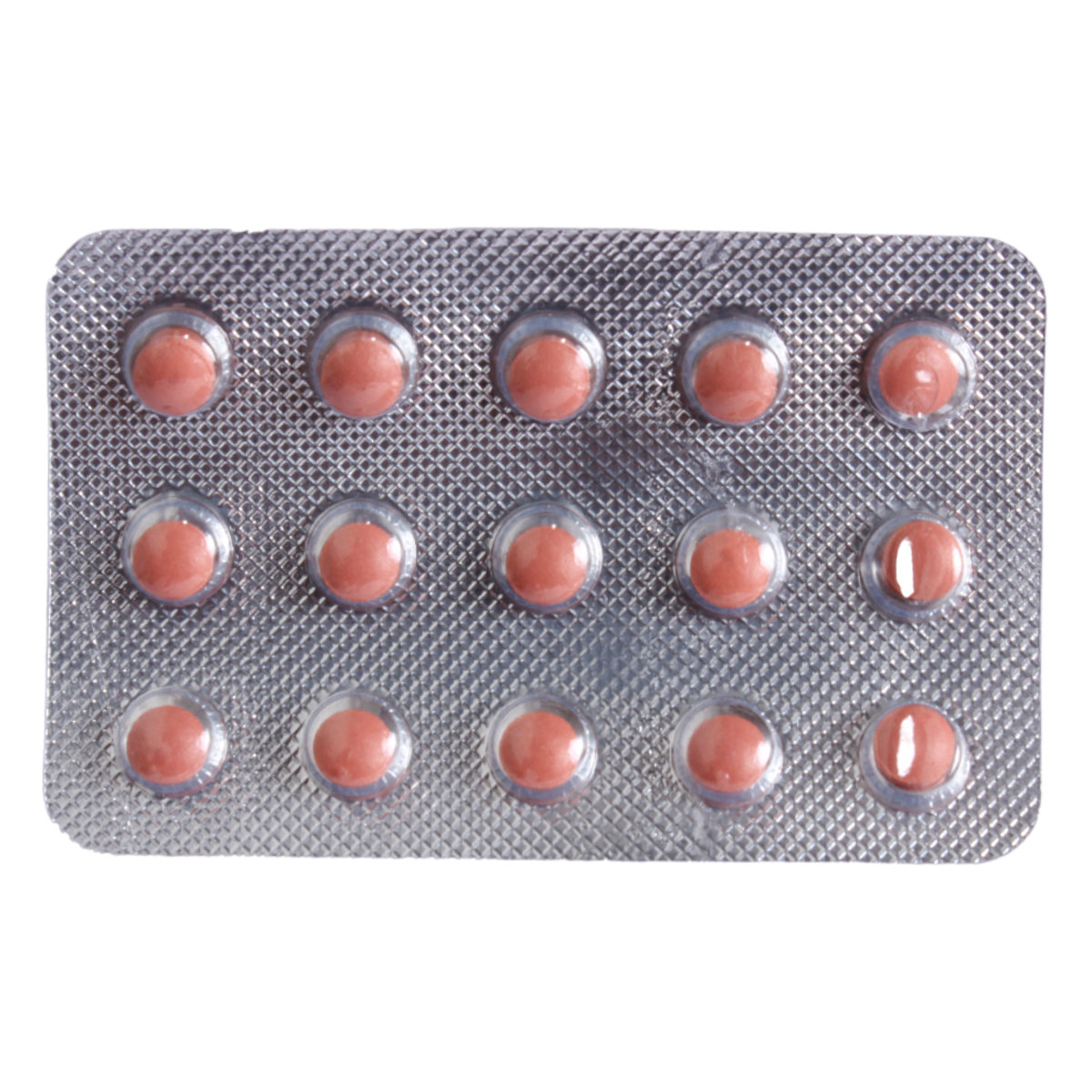
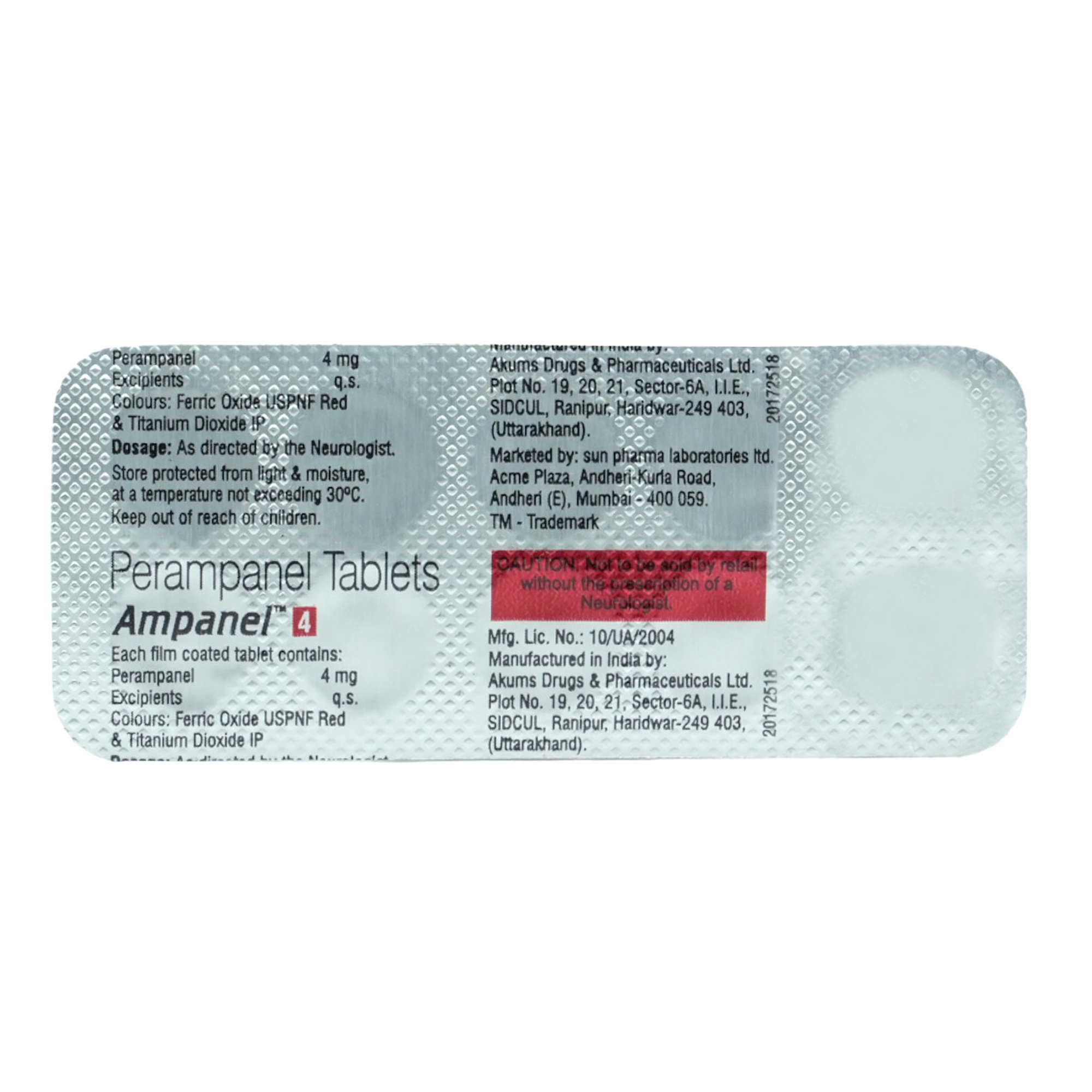
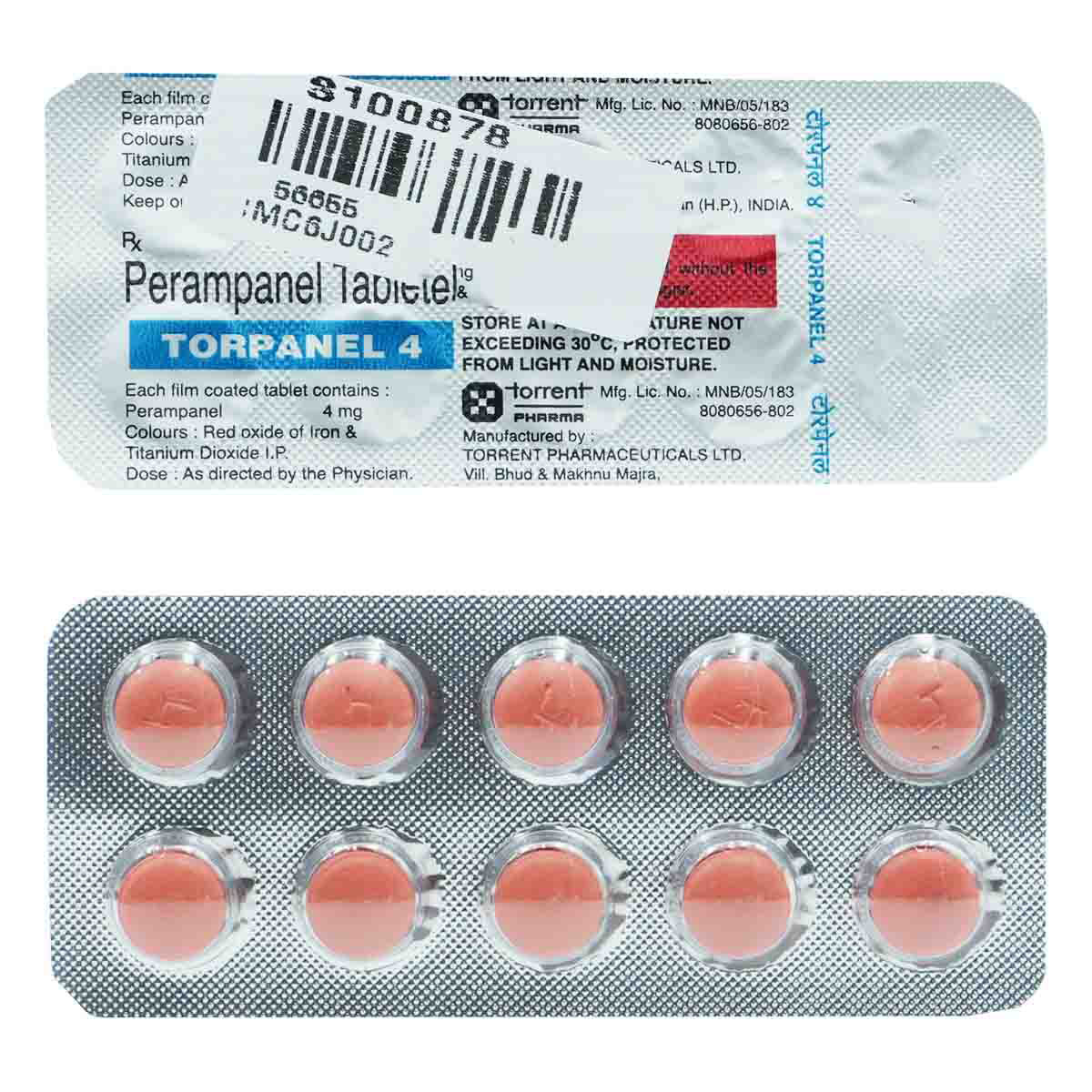
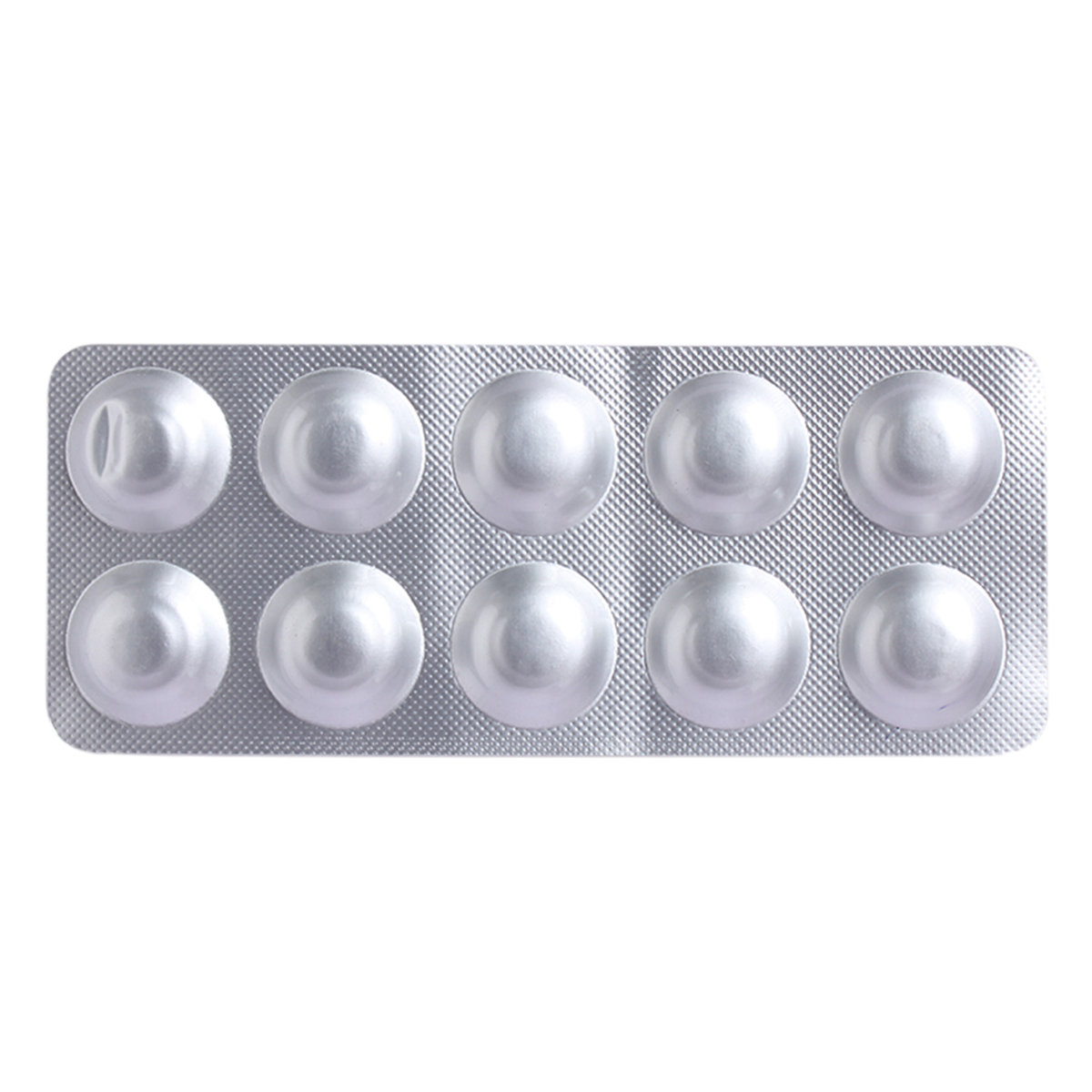
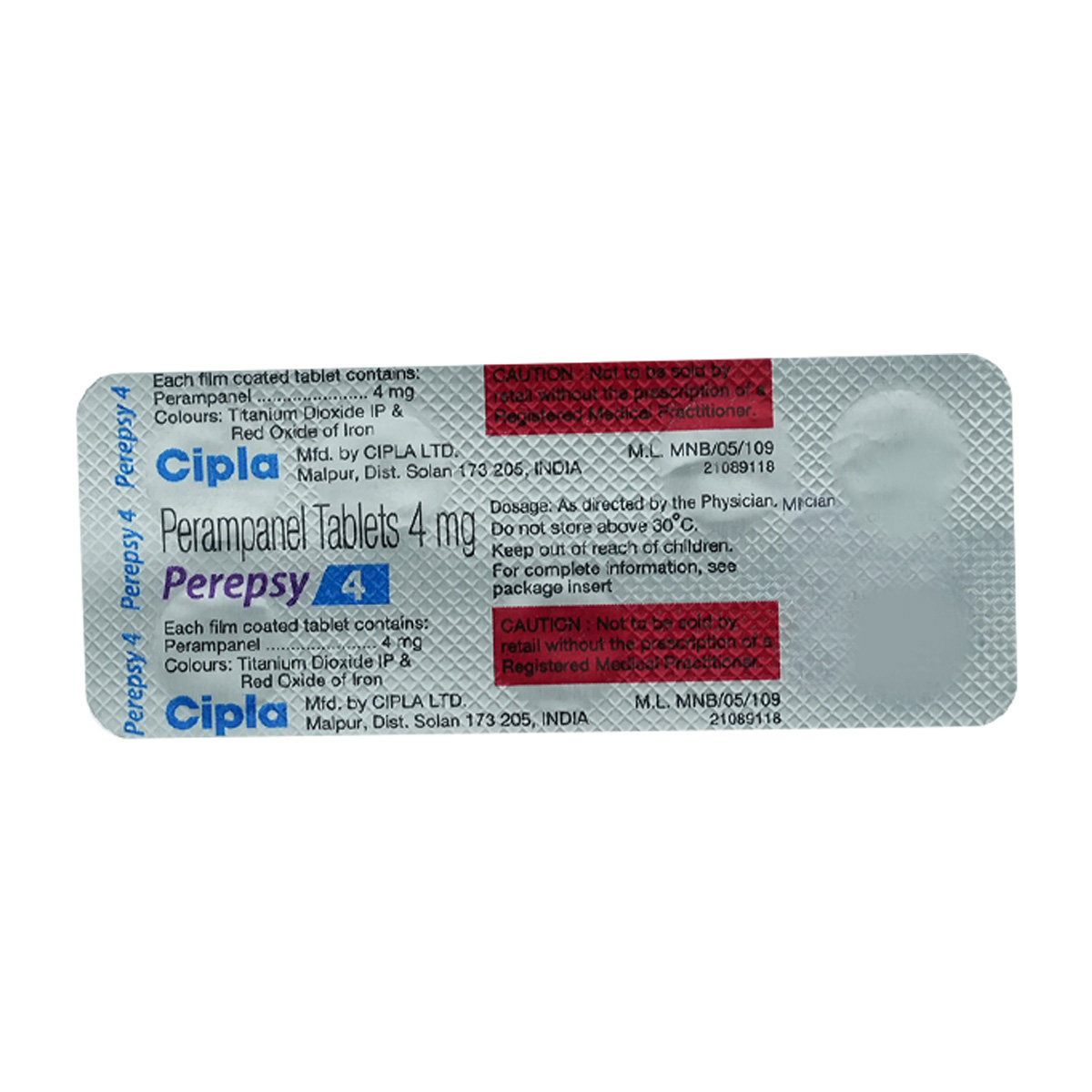
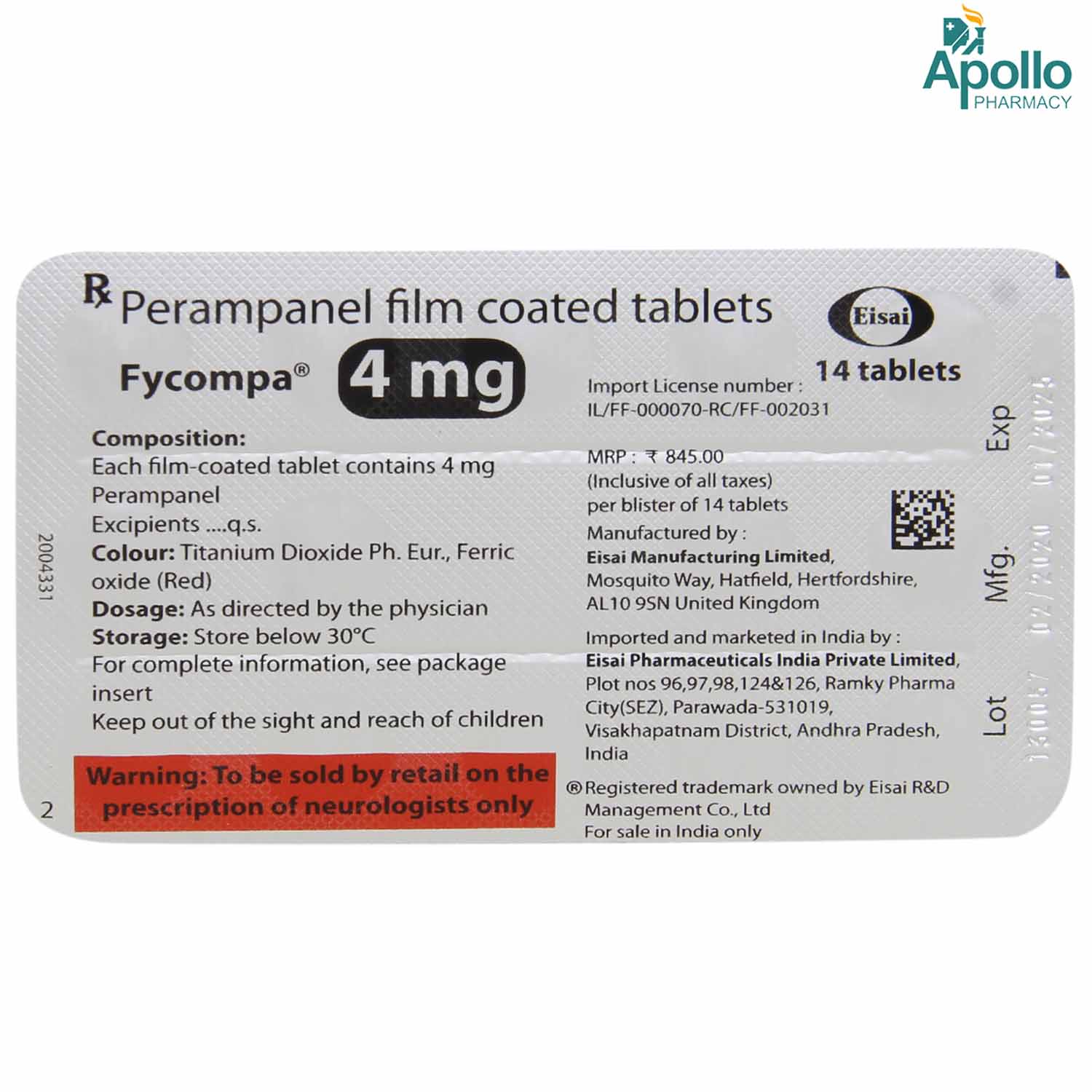


_0.jpg?tr=q-85)
